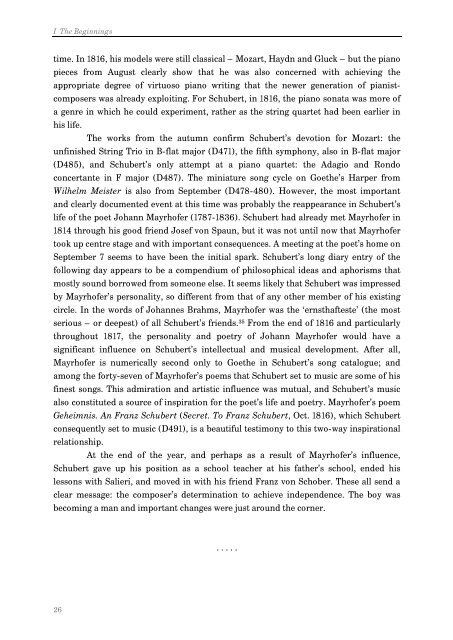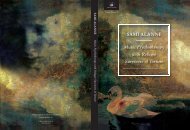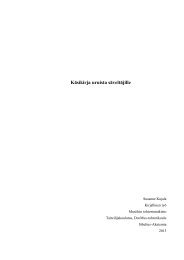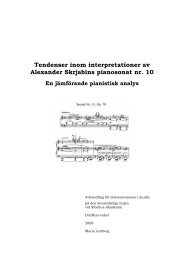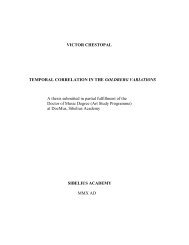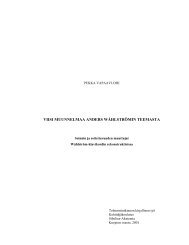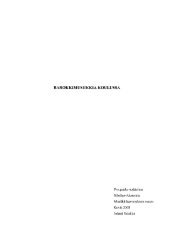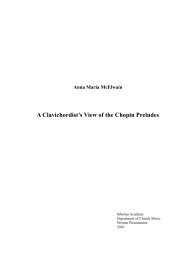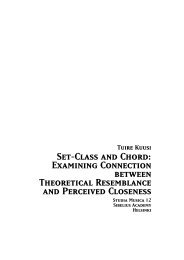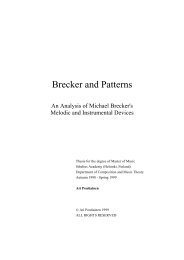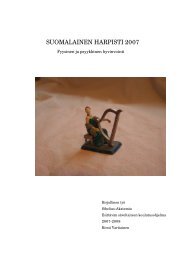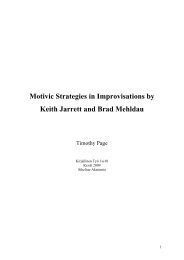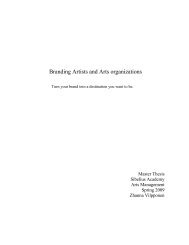The Unfinished Piano Sonatas of Franz Schubert Javier ... - Ethesis
The Unfinished Piano Sonatas of Franz Schubert Javier ... - Ethesis
The Unfinished Piano Sonatas of Franz Schubert Javier ... - Ethesis
You also want an ePaper? Increase the reach of your titles
YUMPU automatically turns print PDFs into web optimized ePapers that Google loves.
I <strong>The</strong> Beginnings<br />
time. In 1816, his models were still classical – Mozart, Haydn and Gluck – but the piano<br />
pieces from August clearly show that he was also concerned with achieving the<br />
appropriate degree <strong>of</strong> virtuoso piano writing that the newer generation <strong>of</strong> pianistcomposers<br />
was already exploiting. For <strong>Schubert</strong>, in 1816, the piano sonata was more <strong>of</strong><br />
a genre in which he could experiment, rather as the string quartet had been earlier in<br />
his life.<br />
<strong>The</strong> works from the autumn confirm <strong>Schubert</strong>’s devotion for Mozart: the<br />
unfinished String Trio in B-flat major (D471), the fifth symphony, also in B-flat major<br />
(D485), and <strong>Schubert</strong>’s only attempt at a piano quartet: the Adagio and Rondo<br />
concertante in F major (D487). <strong>The</strong> miniature song cycle on Goethe’s Harper from<br />
Wilhelm Meister is also from September (D478-480). However, the most important<br />
and clearly documented event at this time was probably the reappearance in <strong>Schubert</strong>’s<br />
life <strong>of</strong> the poet Johann Mayrh<strong>of</strong>er (1787-1836). <strong>Schubert</strong> had already met Mayrh<strong>of</strong>er in<br />
1814 through his good friend Josef von Spaun, but it was not until now that Mayrh<strong>of</strong>er<br />
took up centre stage and with important consequences. A meeting at the poet’s home on<br />
September 7 seems to have been the initial spark. <strong>Schubert</strong>’s long diary entry <strong>of</strong> the<br />
following day appears to be a compendium <strong>of</strong> philosophical ideas and aphorisms that<br />
mostly sound borrowed from someone else. It seems likely that <strong>Schubert</strong> was impressed<br />
by Mayrh<strong>of</strong>er’s personality, so different from that <strong>of</strong> any other member <strong>of</strong> his existing<br />
circle. In the words <strong>of</strong> Johannes Brahms, Mayrh<strong>of</strong>er was the ‘ernsthafteste’ (the most<br />
serious – or deepest) <strong>of</strong> all <strong>Schubert</strong>’s friends. 35 From the end <strong>of</strong> 1816 and particularly<br />
throughout 1817, the personality and poetry <strong>of</strong> Johann Mayrh<strong>of</strong>er would have a<br />
significant influence on <strong>Schubert</strong>’s intellectual and musical development. After all,<br />
Mayrh<strong>of</strong>er is numerically second only to Goethe in <strong>Schubert</strong>’s song catalogue; and<br />
among the forty-seven <strong>of</strong> Mayrh<strong>of</strong>er’s poems that <strong>Schubert</strong> set to music are some <strong>of</strong> his<br />
finest songs. This admiration and artistic influence was mutual, and <strong>Schubert</strong>’s music<br />
also constituted a source <strong>of</strong> inspiration for the poet’s life and poetry. Mayrh<strong>of</strong>er’s poem<br />
Geheimnis. An <strong>Franz</strong> <strong>Schubert</strong> (Secret. To <strong>Franz</strong> <strong>Schubert</strong>, Oct. 1816), which <strong>Schubert</strong><br />
consequently set to music (D491), is a beautiful testimony to this two-way inspirational<br />
relationship.<br />
At the end <strong>of</strong> the year, and perhaps as a result <strong>of</strong> Mayrh<strong>of</strong>er’s influence,<br />
<strong>Schubert</strong> gave up his position as a school teacher at his father’s school, ended his<br />
lessons with Salieri, and moved in with his friend <strong>Franz</strong> von Schober. <strong>The</strong>se all send a<br />
clear message: the composer’s determination to achieve independence. <strong>The</strong> boy was<br />
becoming a man and important changes were just around the corner.<br />
26<br />
. . . . .


